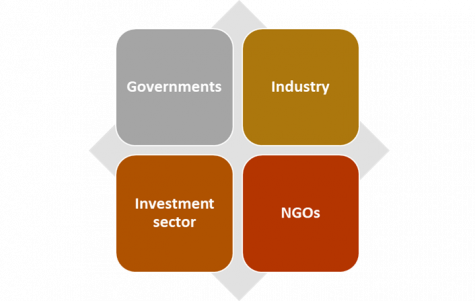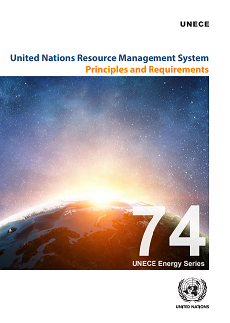Why UNRMS?

UNRMS - A new paradigm in sustainable resource management
The 2030 Agenda for Sustainable Development has inaugurated a new era of global development marked by an imperative to integrate social, environmental and economic objectives. The multifaceted requirements of sustainable development depend on optimal and responsible production and use of natural resources. Today’s supply and use patterns of natural resources are unsustainable. They present challenges in terms of environmental and societal impact and the long-term availability of the resources needed for sustainable development.
Over many years, the United Nations Framework Classification for Resources (UNFC) has become a unified system for classifying, accounting and reporting on activities associated with resource production based on social, environmental and economic viability, technical feasibility and degree of confidence in resource estimates.
In 2017, UNECE member States decided to extend UNFC beyond a classification system to a dynamic resource management system that can help countries, organizations, and companies address sustainability challenges. The Expert Group on Resource Management (EGRM) has been tasked to develop the United Nations Resource Management System (UNRMS), a voluntary global standard for integrated and sustainable resource management.
UNRMS – a bird’s eye view
UNRMS is the “Swiss Army knife” to tackle sustainability and technology challenges. It will include high-impact technologies that encourage efficient discovery and modelling of in-place resources and allow higher precision during recovery and processing.

UNRMS Stakeholders
UNRMS is a comprehensive resource management system for sustainable development that is expected to be future-facing. It will support stakeholders in various goals, including aiding the incorporation of a circular economy wherever possible. The critical objective of UNRMS is to support the United Nations Decade of Action for accelerating sustainable solutions for resource management. UNRMS will consider various resources not as isolated or independent sectors but as part of the whole resource base of an area, region or country.
Read UNRMS: An overview of concepts, objectives and requirements
UNRMS Objectives
UNRMS is designed to be a/an:
- Global voluntary system for resource management to be used by governments, industry, investors, and civil society;
- Innovative integrated resource management framework for resources such as minerals, petroleum, renewable energy sources, nuclear resources, anthropogenic resources, geological storage and groundwater to support the development of policies and regulations in the sustainable management and advancement of the Sustainable Development Goals (SDGs);
- Comprehensive information framework and methodology to support resource progression applicable for programme, portfolio, project and asset-level management;
- Sustainability framework to aid the financing of resource sectors;
- System for local and indigenous communities for evaluating and assessing projects against stated environmental-social-economic objectives;
- Scheme for long-term considerations of commercial and policy aspects of projects;
- Design of conditions for the industry to harness the integrative dynamic capabilities;
- Support kit for projects to help align with applicable regulations;
- Instrument to support sustainability and financial reporting.
UNRMS includes the fundamental principles and requirements of resource management for sustainable development. The system will also have tools to assist in analysis and decision-making.

UNRMS Fundamental Principles
Economic and Social Council (ECOSOC) Decision
At its 43rd plenary meeting, on 25 July 2023, the United Nations Economic and Social Council took the following decision (E/RES/2023/19):
resolution, endorsed the United Nations Resource Management System Principles and Requirements of 14 April 2022, recommended that the Principles and Requirements
be disseminated widely, invited States Members of the United Nations, international organizations and the regional commissions to consider the possibility of taking
appropriate measures to ensure the application of the Principles and Requirements worldwide, and proposed to the Economic and Social Council that it recommend the
application of the Principles and Requirements worldwide, and noting that this proposal does not have financial implications,
Decides to invite States Members of the United Nations, international organizations and the regional commissions to consider the possibility of taking appropriate measures to ensure the application of the United Nations Resource Management System Principles and Requirements worldwide.
UNRMS: Principles and Requirements

2022 - United Nations Resource Management System: Principles and Requirements.
In Arabic | Chinese | English | French | Russian | Spanish
UNRMS Background and Concept Notes
2018 - UNFC supporting the attainment of Sustainable Development Goals Transforming our world's natural resources: A step change for UNFC? ENG FRE RUS
2019 - United Nations Resource Management System: Concept and design
2020 - UNRMS Concept note: Objectives, requirements, outline and way forward
2021 - UNRMS: Structure and guidelines
2022 - Draft of the United Nations Resource Management System: Principles and Requirements
2022 - Concept Note: UNFC and UNRMS - Systems approach to enabling the resource as a service paradigm through blockchain technologies ENG FRE RUS
2022 - Sustainable management of critical raw materials required for the low-carbon energy transition
Related documents
2021 - UN Policy Brief: Transforming Extractive Industries for Sustainable Development
2021 - Natural Resource Nexuses in the ECE region / Взаимосвязанные области по природным ресурсам в регионе ЕЭК
2022 - Carbon Neutrality in the UNECE Region: Integrated Life-cycle Assessment of Electricity Sources / Corrigendum
2023 - UN-Energy Policy Brief: Aligning Critical Raw Materials Development with sustainable development
UNRMS Sub-group
UNRMS Sub-group is tasked with the development and maintenance of UNRMS.
UNRMS Workshops
- First UNRMS Workshop, 5 August 2021
- Second UNRMS Workshop, 5 August 2021
- Third UNRMS Workshop, 7 September 2022
UNRMS Videos
What is the UNRMS? (University of Exeter, UK)
UNRMS use in Cornwall (University of Exeter, UK)

